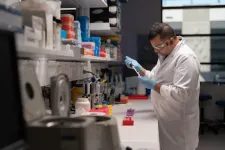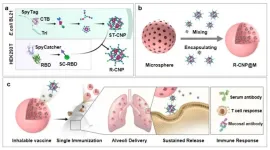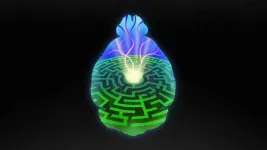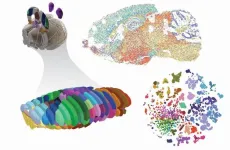(Press-News.org) Infusions of potentially therapeutic cells derived from the heart are safe for people with pulmonary arterial hypertension, a form of high blood pressure that occurs in the blood vessels of the lungs and typically affects middle-aged women, according to a study led by Cedars-Sinai investigators.
The Phase I clinical trial results are published in the peer-reviewed journal eBioMedicine, a Lancet journal.
“Although several drugs are approved for pulmonary arterial hypertension, mortality remains high,” said Eduardo Marbán, MD, PhD, executive director of the Smidt Heart Institute at Cedars-Sinai, the Mark S. Siegel Family Foundation Distinguished Professor and senior author of the study. “We tried a fundamentally different approach—cell therapy delivered into the pulmonary artery—and found encouraging results, in patients already on combination conventional therapy."
Pulmonary arterial hypertension is a rare disease, affecting fewer than 100 people per million. There currently is no cure and the average median life expectancy on treatment for most patients is roughly 6.2 years after diagnosis.
Currently approved medications for the condition aim to open up blood vessels in the lungs, allowing for better blood flow; however, studies on lungs in patients on treatment still show severe occlusive vessel changes. Further, these medications don’t address many of the complex underlying mechanisms that cause the high pulmonary pressures. Even on medication, people with pulmonary arterial hypertension can develop severe dysfunction in the right ventricle of the heart, the part that pumps blood to the lungs and whose function correlates best with survival.
Cedars-Sinai investigators are experimenting with using cardiosphere-derived cells (CDCs) to address some of the biological processes involved in pulmonary arterial hypertension. CDCs were first developed and characterized by Marbán. They have been used in multiple clinical trials for a variety of diseases, most recently, Duchenne muscular dystrophy. These are cells derived from human heart tissue that Marbán and colleagues have discovered reduce inflammation in the body and exert beneficial effects on the immune system.
Called the ALPHA study, this clinical trial was conducted in two phases. In the first, six people with pulmonary arterial hypertension received an infusion of CDCs into their lungs. Three patients received an infusion of 50 million CDCs and the other three received an infusion of 100 million CDCs.
In the second phase, 10 people with pulmonary arterial hypertension were randomized to receive an infusion of 100 million CDCs and 10 people were randomized to receive infusions containing a placebo. Investigators performed right heart catheterization and cardiac MR imaging on each study participant before the infusions and four months after the infusions.
All the participants were on combination pulmonary arterial hypertension-specific medications throughout the course of the study.
The investigators tracked the health of participants for 12 months after the infusions. No adverse effects related to the infusions occurred during this time. Although this study was only designed to assess the safety of the CDC infusions, the investigators observed encouraging changes that might indicate the 16 people who had received the CDC infusions had improved cardiopulmonary health. People who received the infusions, for example, showed improved functioning in the heart’s right ventricle and, at two months post-infusion, were able to walk a greater distance during a six-minute test than people who received placebo.
“The most important takeaway is that this approach is safe and feasible to do in people with pulmonary arterial hypertension,” said Michael I. Lewis, MD, director of Respiratory Care Services at Cedars-Sinai, and first and corresponding author of the study. “These are encouraging exploratory findings that motivate moving on to more advanced studies.”
The investigators plan additional trials to study the effects of repeated infusions of CDCs given to people with pulmonary arterial hypertension.
Cedars-Sinai investigators Mamoo Nakamura, MD; Dael Geft, MD; Yuri Matusov, MD; James Mirocha; Antoine Hage, MD; Victor Tapson, MD; Oleg A. Karpov, PhD; and Jennifer Van Eyk, PhD, also worked on the study.
Funding: The study was funded by the California Institute for Regenerative Medicine (CIRM), one of the world’s largest institutions dedicated to three key areas of regenerative medicine—research, education and patient access.
END
Unique cell-based approach for pulmonary arterial hypertension shown to be safe
Phase I trial results also hint at improved cardiopulmonary function in people with this life-threatening condition
2023-12-13
ELSE PRESS RELEASES FROM THIS DATE:
Study analyzes what babies hear, say on six continents
2023-12-13
Elika Bergelson, associate professor of psychology at Harvard University, studies how infants and toddlers learn language from the world around them. The developmental psychologist specifically strives to parse the various theories that account for the onset and eventual mastery of language comprehension and production. Bergelson’s latest paper, published this month in the Proceedings of the National Academy of Sciences, represents a more global approach to developing and testing such theories.
Written ...
Heart attack deaths spike during the winter holidays
2023-12-13
DALLAS, Dec. 13, 2023 — The winter holidays can turn deadly as research shows that more people die from heart attacks during the last week of December than at any other time of the year. While being aware of the signs of a heart attack and taking steps to reduce your risk are important all year long, the American Heart Association, the world’s leading voluntary organization focused on heart and brain health for all, says that’s especially critical during the next few weeks.
A number of scientific studies confirm ...
MD Anderson Research Highlights for December 13, 2023
2023-12-13
HOUSTON ― The University of Texas MD Anderson Cancer Center’s Research Highlights showcases the latest breakthroughs in cancer care, research and prevention. These advances are made possible through seamless collaboration between MD Anderson’s world-leading clinicians and scientists, bringing discoveries from the lab to the clinic and back.
Recent developments at MD Anderson include a novel blood-based test to predict lung cancer relapses, improved detection of genes associated with complex traits, insights into how B cell activity influences immunodeficiency, novel targets that drive treatment ...
DNA discovery opens door to personalised medicine for Indigenous Australians
2023-12-13
The most comprehensive analysis of Indigenous Australians’ genomes collected to date has revealed an “abundance” of DNA variations – some of which have never been reported anywhere else in the world – paving the way for new, personalised treatments that address health inequities for Aboriginal and Torres Strait Islander peoples.
A team of Australian researchers, led by scientists from The Australian National University (ANU), found DNA differences between Indigenous Australians living in the Tiwi Islands and Indigenous peoples living in the Australian ...
Researchers develop a novel dry-powder inhaled vaccine platform
2023-12-13
Researchers from the Institute of Process Engineering (IPE) of the Chinese Academy of Sciences have proposed a new “nano-micro composite” delivery concept for vaccines. Based on this idea, they have developed a single-dose, dry-powder, inhalable vaccine platform using nano-micro composite multilevel structures, which has been successfully prepared in the laboratory, and the vaccine has been shown to be effective in blocking respiratory viral infection and transmission in animal models. This platform holds great promise for combating future emerging and epidemic infectious diseases.
This ...
Growing use of hemp-derived alternative cannabis products containing CBD, Delta-8-THC, CBG, CBN
2023-12-13
Cannabis use for medicinal or recreational purposes is now permitted is most states in the U.S. Many of the products sold in dispensaries contain delta-9-tetrahydrocannabinol (better known as “THC”), and are thus classified as Schedule I drugs, making them illegal under federal law.
However, there is a parallel market for products derived from hemp—defined as cannabis containing less that 0.3 percent THC—spurred in part by the passage of the 2018 Farm Bill, which removed hemp-derived cannabinoids from the federal Controlled Substances Act.
A new U-M study published in JAMA Network Open examines past-year use of some of these hemp-derived ...
Penn Medicine research shows how stress activates neurons that disrupt sleep
2023-12-13
PHILADELPHIA— New research reveals that neurons in the preoptic hypothalamus—the region of the brain that regulates sleep and body temperature—are rhythmically activated during non-rapid eye movement sleep (NREM). Stress activates these brain cells out of turn, causing “microarousals,” that interrupt sleep cycles and decrease the duration of sleep episodes, according to research from Perelman School of Medicine at the University of Pennsylvania, published today in Current Biology.
While our bodies are at rest when we are asleep, ...
New study sheds light on how the brain learns to seek reward
2023-12-13
By Jake Siegel
Imagine you’re teaching a dog to play fetch. You throw a ball, and your dog sprints after it, picks it up, and runs back. You then reward your panting pup with a treat. But now comes the real trick for your dog: figuring out which part of that sequence earned the treat. Scientists call this the 'credit assignment problem' in the brain. It's a fundamental question about understanding which actions are responsible for the positive outcomes we experience.
Dopamine, a key chemical ...
Salk teams assemble first full epigenomic cell atlas of the mouse brain
2023-12-13
LA JOLLA (December 14, 2023)—Salk Institute researchers, as part of a worldwide initiative to revolutionize scientists’ understanding of the brain, analyzed more than 2 million brain cells from mice to assemble the most complete atlas ever of the mouse brain. Their work, published December 14, 2023 in a special issue of Nature, not only details the thousands of cell types present in the brain but also how those cells connect and the genes and regulatory programs that are active in each cell.
The efforts were coordinated by the National Institutes of Health’s Brain Research Through Advancing Innovative Neurotechnologies® Initiative, or the BRAIN Initiative®, ...
Scientists unveil first complete cellular map of adult mouse brain
2023-12-13
By Jake Siegel
Six years and 32 million cells later, scientists have created the first full cellular map of a mammalian brain. In a set of 10 papers in Nature today, a network of researchers unveiled an atlas cataloging the location and type of every cell in the adult mouse brain. Using advanced technologies that profile individual cells, the teams identified over 5,300 cell types – far more than known before – and pinpointed their locations within the brain’s intricate geography. ...
LAST 30 PRESS RELEASES:
New ‘scimitar-crested’ Spinosaurus species discovered in the central Sahara
“Cyborg” pancreatic organoids can monitor the maturation of islet cells
Technique to extract concepts from AI models can help steer and monitor model outputs
Study clarifies the cancer genome in domestic cats
Crested Spinosaurus fossil was aquatic, but lived 1,000 kilometers from the Tethys Sea
MULTI-evolve: Rapid evolution of complex multi-mutant proteins
A new method to steer AI output uncovers vulnerabilities and potential improvements
Why some objects in space look like snowmen
Flickering glacial climate may have shaped early human evolution
First AHA/ACC acute pulmonary embolism guideline: prompt diagnosis and treatment are key
Could “cyborg” transplants replace pancreatic tissue damaged by diabetes?
Hearing a molecule’s solo performance
Justice after trauma? Race, red tape keep sexual assault victims from compensation
Columbia researchers awarded ARPA-H funding to speed diagnosis of lymphatic disorders
James R. Downing, MD, to step down as president and CEO of St. Jude Children’s Research Hospital in late 2026
A remote-controlled CAR-T for safer immunotherapy
UT College of Veterinary Medicine dean elected Fellow of the American Academy of Microbiology
AERA selects 34 exemplary scholars as 2026 Fellows
Similar kinases play distinct roles in the brain
New research takes first step toward advance warnings of space weather
Scientists unlock a massive new ‘color palette’ for biomedical research by synthesizing non-natural amino acids
Brain cells drive endurance gains after exercise
Same-day hospital discharge is safe in selected patients after TAVI
Why do people living at high altitudes have better glucose control? The answer was in plain sight
Red blood cells soak up sugar at high altitude, protecting against diabetes
A new electrolyte points to stronger, safer batteries
Environment: Atmospheric pollution directly linked to rocket re-entry
Targeted radiation therapy improves quality of life outcomes for patients with multiple brain metastases
Cardiovascular events in women with prior cervical high-grade squamous intraepithelial lesion
Transplantation and employment earnings in kidney transplant recipients
[Press-News.org] Unique cell-based approach for pulmonary arterial hypertension shown to be safePhase I trial results also hint at improved cardiopulmonary function in people with this life-threatening condition




